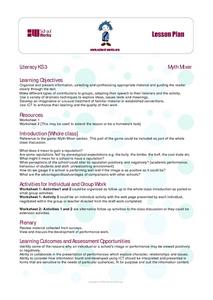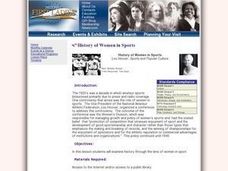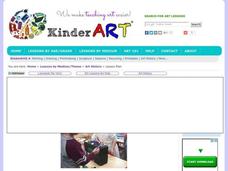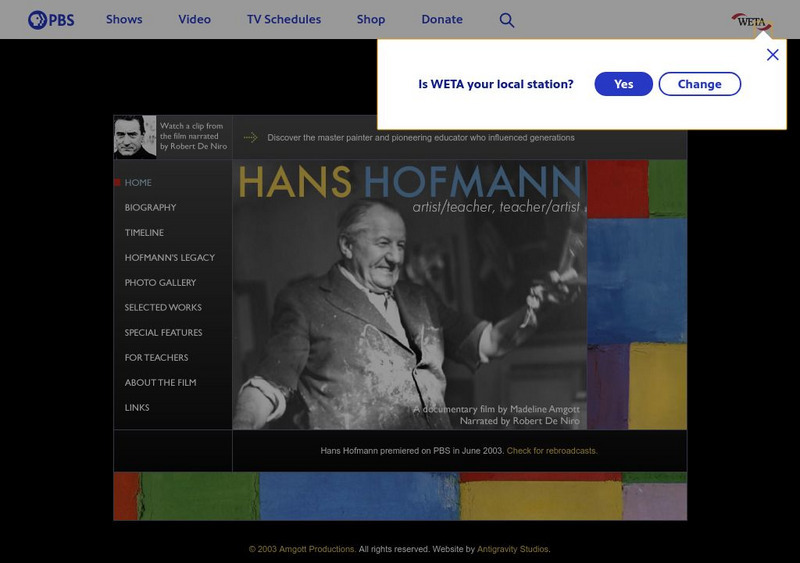Curated OER
What's in a Name? Considering the Shakespeare Authorship Question
Did Shakespeare really write all that stuff? After viewing a trailer for the film, Anonymous and reading Stephen Marche’s article “Wouldn’t It Be Cool If Shakespeare Wasn’t Shakespeare?” class groups read articles about the Shakespeare...
LearnEnglishFeelGood.com
Participles Used As Adjectives
Is a movie interesting or interested? Use context clues to decide which participle would be the most appropriate in each of ten sentences.
Curated OER
Myth Mixer
Your class can organize and present information. Theyselect and synthesize material then guide a reader therough the text. They make different types of contributions to groups, adapting their speect to their listeners and the activity. A...
Curated OER
Fossil Fuels: Understanding a Nonrenewable Resource
Incorporate fossil fuel issues into your curriculum with these lesson plan ideas.
National First Ladies' Library
History of Women in Sports
Learners examine online or hard copy timelines of athletics, discuss what they like and dislike about time tables they have reviewed, research in small groups history of basketball, baseball, gymnastics, or track and field, and create...
Curated OER
Invention Convention
Invent a new machine for the 21st century and make a model of the invention in this cross-curricular lesson about Leonardo da Vinci. Young inventors will use various art supplies to create their models. The lesson includes resource links...
Common Sense Media
Common Sense Media: Education: Protecting Online Reputations
Tagging friends on social media is a great way to connect with others and capture memorable experiences. But what if they don't want to be tagged? Encourage your students to take responsibility for how they may affect the digital...
REMC Association of Michigan
Remc Association of Michigan: 21 Things4 Students: 9. Search Strategies
In this learning module, students learn how to: use Michigan eLibrary, boolean logic, and dictionary.com; use search engines; choose reputable websites; cite sources; and differentiate between real and fake information. Includes an...
Varsity Tutors
Varsity Tutors: Web English Teacher: Herman Melville
This site provides lesson plans, e-notes, activities, and other resources for teaching young scholars Herman Melville's novels and fiction, including Moby-Dick, Bartleby, the Scrivener, Billy Budd, and so on.
Common Sense Media
Common Sense Media: Education: Who's Looking at Your Digital Footprint?
Our digital footprints can have a powerful impact on our future. This can be a scary thought, given that what's in our digital footprint isn't always in our control. Teach students that digital footprints are an opportunity to showcase...
Common Sense Media
Common Sense Media: Education: Curated Lives
Social media gives us a chance to choose how we present ourselves to the world. We can snap and share a pic in the moment or carefully stage photos and select only the ones we think are best. When students reflect on these choices, they...
Other
Education World: Promoting Responsible and Ethical Digital Citizens
This article discusses ways teachers can train today's generation to be responsible and ethical life-long learners in the digital age. Topics include care of technology equipment, using reputable sites for studies and research, adhering...
PBS
Pbs: Hans Hofmann: Artist: Teacher, Teacher: Artist
This companion website for a PBS documentary about Hans Hofmann includes all the essential information about Hofmann, whose reputation as a teacher almost eclipses his reputation as an artist. Wonderful site for exploring how artists...
Media Smarts
Media Smarts: Promoting Ethical Behaviour Online: My Virtual Life Lesson
In this lesson, students learn about ways to manage their privacy and reputation online by exploring their digital presence and to make good choices about sharing other people's content online. Students explore how they are portrayed...
Utah Education Network
Uen: The Good, the Bad, and the Both
After exposures to assorted forms of informational text and media, Istudents will identify positive and negative effects of microorganisms. Students will explore how some micooorganisms have overcome their negative attributes while...
University of Sydney (Australia)
The Write Site: Why & How to Use Sources
This University of Sydney reference explains the importance of using reputable sources in academic writings. Then the site provides steps to follow to assist students with using bibliographic sources. Click on the sections list to...
Council for Economic Education
Econ Ed Link: Business Ownership: The Franchise Option
Students explore an alternative to starting a business from scratch- investing in a franchise. They begin by considering the pros and cons of a franchise and whether this form of business is an option that would fit their personality and...
Writing Fix
Writing Fix: Responding to Comarison/contrast: Unusual Smear Campaigns [Pdf]
In this PDF lesson, pupils unpack two opposite concepts by creating an imaginary "Smear Campaign," pretending the two concepts are opposing each other in election. Students may create print, radio, or television ads to show how their...
ClassFlow
Class Flow: Evaluate Site
[Free Registration/Login Required] This flipchart provides students with strategies for researching on the internet and how to tell if a resource is reputable. CCSS.ELA-Literacy.CCRA.R.7
Curated OER
Educational Technology Clearinghouse: Clip Art Etc: Bishop Hugh Latimer
Hugh Latimer (c. 1485-October 16, 1555) was the bishop of Worcester, and by his death he became a famous martyr among Protestants and the Church of England. From around 14 years of age he started to attend Peterhouse, Cambridge, and was...










